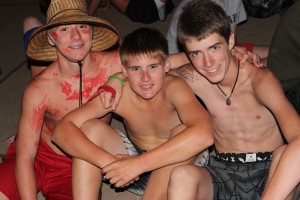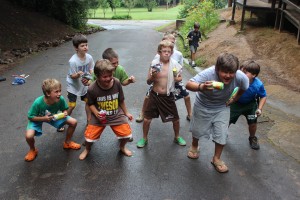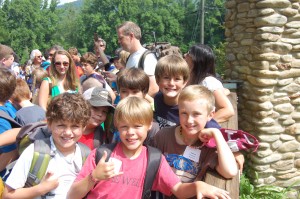Why Kids Flourish at Camp
Posted by Phil Campers often describe camp as their “happy place”” or “the best two weeks” of their year. And, from my own observation, I’ve seen that kids and the counselors who work with them are obviously happy at camp. They smile a lot. They look relaxed. There’s a lot of laughter. So many fun things happen at camp every day that it’s no surprise it’s such a happy place for kids.
Campers often describe camp as their “happy place”” or “the best two weeks” of their year. And, from my own observation, I’ve seen that kids and the counselors who work with them are obviously happy at camp. They smile a lot. They look relaxed. There’s a lot of laughter. So many fun things happen at camp every day that it’s no surprise it’s such a happy place for kids.
Recently I’ve read several books about the science behind happiness and the research that’s being done to determine the specific elements that cause people to “flourish” in life. (See my reading list below.)
Traditionally, psychologists have focused on studying psychological diseases – depression, anxiety, eating disorders, etc. – and their cures. But led by Martin Seligman (University of Pennsylvania), a new breed of psychologists called Positive Psychologists have, for the past decade, been studying the positive side of people. They ask not what is wrong with people, but what is right. They research what makes us do well in life and the reasons why some people thrive and find success and happiness in life.
Originally, Seligman had a theory of “happiness” outlined in his book Authentic Happiness, but he moved away from only using the word “happiness” to a new theory that focuses instead on well-being or “flourishing.” Seligman determined that it’s inaccurate to use the term “happiness,” as some people simply don’t have the personality to appear outwardly happy to others, even when they are doing quite well in life. I’m an extrovert who smiles a lot, so, objectively, people would probably say I’m pretty high on the happy scale. But how do we account for an introvert who doesn’t show a lot or emotion or display the outward symptoms that we equate with happiness? He may not smile a lot or appear outwardly happy, but, Seligman contends, he could still be flourishing. So, instead of using a one-dimensional definition that’s dependent on momentary emotions and personality traits, Seligman developed a more thorough theory of well-being that moved beyond his original happiness theory.
Seligman’s uses the acronym PERMA to define his theory and the five measurable elements he has determined lead to well-being. As I read about each pillar of PERMA in Seligman’s book, Flourish: A Visionary New Understanding of Happiness and Well-being, I kept having “ah-ha” moments. “This happens at camp!” I would think. “And this, too!” In fact, as I read, I determined that ALL of the elements of flourishing that Seligman describes happen at camp. According to Seligman, “No one element defines well-being, but each contributes to it.”
I’ve always been sucked in by inspirational quotes and quick sounds bites about how camp contributes to happiness, but I love knowing the science behind why kids flourish at camp.
PERMA at Camp… Read more… from Sunshine Parenting…
Posted in Just For Parents | Tagged Camp Crestridge, Camp Ridgecrest, parent articles, parent resources, parenting, Ridgecrest Summer Camps, summer camp | Leave a reply
My Daughter Went Away to Camp and Changed
Posted by PhilWhen I look at my phone, I see my daughter leaving for camp on my home screen. She stands at the bottom of an airport escalator, an orange backpack over her shoulder. She’d cut her long, strawberry blond hair the day before, so the person smiling from under the carrot top doesn’t look familiar. But the image of a kid who just needs a backpack and a ticket is one I recognize. Some parents may have to nudge their children to camp. For the last two summers, our daughter has run out the door. “Yukon ho!” she yelled when leaving this year, an expression she learned from Calvin and Hobbes‘ main character Calvin, whom she now resembles.
I hadn’t been at the National Airport departure gate for her first trip as an Unaccompanied Minor. I was in the stands at my son’s baseball tournament. For pickup my wife and I flipped the load-sharing. She did baseball duty, and I flew to Minnesota, driving almost four hours to a packed-dirt road lined with birch trees that ended at the shores of Lake Pokegama: Camp Mishawaka. Thirty-six years earlier, I had been the 9-year-old flying alone from Washington to this place with a new haircut.
When I was at camp, my parents didn’t know what was happening to me. We weren’t allowed to use the telephone, so even on my birthday I just received word that they’d called to wish me a happy one. All they got on their end was a handful of sentences written in loopy script with scattershot spelling. Technology makes hovering easier now. For the last few weeks, my wife and I ended our days poking around on the camp website, scanning photographs for the flash of red hair among the campers playing capture the flag and canoeing. Now, as I stood on the soft grass at the edge of the compound, I was doing the same scan, watching my daughter fling herself around along with the other campers, passing time before the organizing ring of the dinner bell.
Posted in Just For Parents | Tagged Camp Crestirdge, Camp Parents, Camp Ridgecrest, parent articles, parenting, raising boys, summer camp | Leave a reply
Should I Be Sending My Children to Camp
Posted by Phil An interesting article from Michael Thompson Ph.D
An interesting article from Michael Thompson Ph.D
Some six million children in the United States are preparing psychologically to go away to sleepaway camp. Whether these departing children are camp veterans or nervous rookies, they are mentally rehearsing being away from mom and dad, their comfortable beds, their pets, favorite meals and, of course, their beloved iPhones, Facebook and video games.
During the winter their parents made the decision — and found the money — to make it possible for their kids to leave their families and their comfortable homes so that they could spend a week or two or four in a rustic, more-or-less uncomfortable cabin getting bitten by mosquitoes. They will live with a bunch of other kids, some of whom are fantastic, others quite annoying. They will eat a balanced diet of grilled cheese sandwiches and Fudgesicles with the occasional corn dog for good measure. They will play fun but aimless games like “Capture the Flag” and sit around campfires watching hilarious, dumb skits that almost no one remembers two days later (except the authors, of course). They will master skills such as archery and kayaking, horseback riding and waterskiing, none of which will impress their varsity coach or their AP Bio teacher when they return to school.
While the campers are messing about in the woods, many of their peers will be attending summer school or specialized skills programs. Their responsible, if sometimes Tiger-ish, moms and dads will be investing their money in their children’s future differently, sending them to one-week soccer and lacrosse programs, SAT prep courses and unpaid internships designed to polish skills, boost scores and impress college admissions officers. Instead of spending three weeks at an all-around camp, these children will be focused on skill-building, sometimes in three different specialized programs to which their parents drive them every day (allowing time for that all-important debrief in the car going home).
Which set of parents has it right? Or more to the point: Does an overnight camp experience still make sense in this competitive, resume-building world? From this psychologist’s point of view, the answer is a resounding YES. I believe that children develop in profound ways when they leave their parents’ house and join a camp community.
Learning to sleep away from home is, of course, a critical step on the way to independence. Part of the challenge is beating homesickness, which may be hard for some children, and which, by definition, your parents cannot help you do. Kids know they have to do this sooner or later. As my son once remarked with horror, “If you can’t learn to sleep away from home, you have to live with your parents for the rest of your life.” But beyond that, there are things that, as a parent, you cannot do for your children, as much as you might wish to. You cannot make them happy (if you try too hard they become whiners); you cannot give them self-esteem and confidence (those come from their own accomplishments); you cannot pick friends for them and micro-manage their social lives, and finally you cannot give them independence. The only way children can grow into independence is to have their parents open the door and let them walk out. That’s what makes camp such a life-changing experience for children.
Finish the Article by clicking here…
by Michael Thompson Ph.D
Author “Homesick and Happy”
Posted in Just For Parents | Tagged Camp Crestridge, Camp Ridgecrest, Just for Parents, parent resourses, Ridgecrest Summer Camps, sleepaway camps, summer camp | Leave a reply
